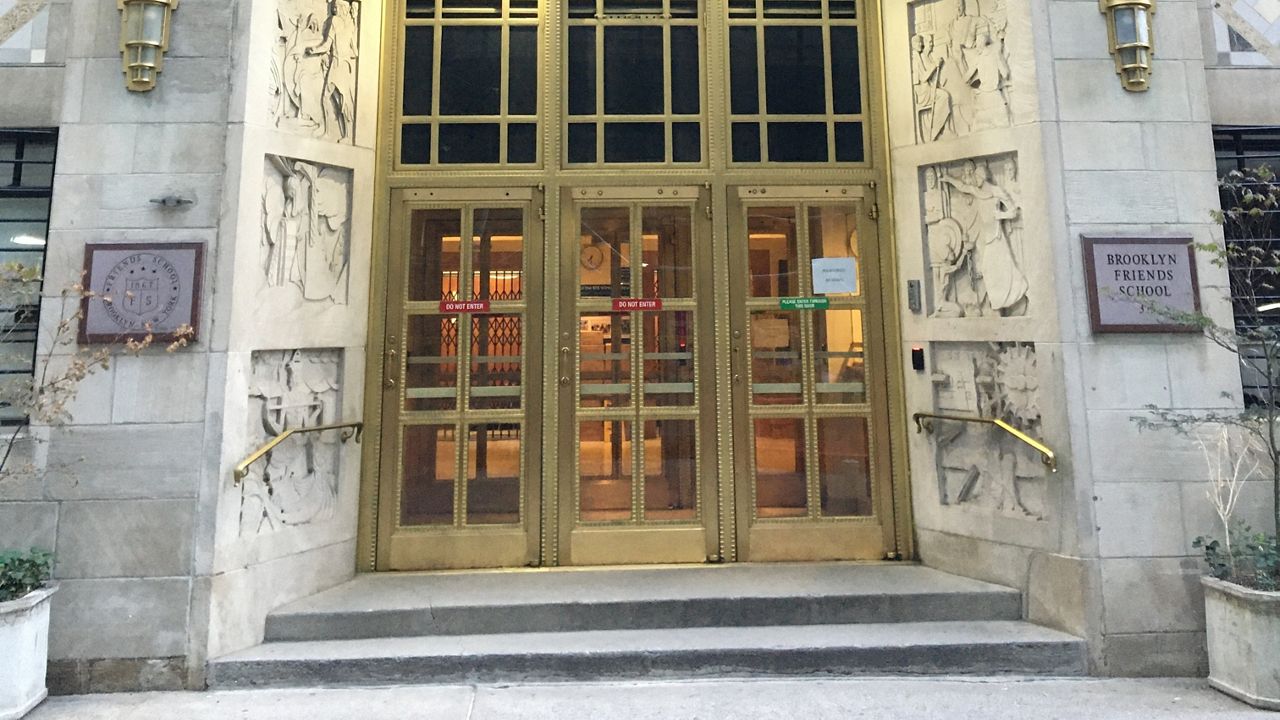NEW YORK CITY — A progressive Quaker school is relying on a new Trump Administration ruling in an attempt to bust its union, outraged teachers and parents say.
Brooklyn Friends School filed last week to a federal labor agency a petition that questions the right of a recently-formed union — made up of BFS teachers, staff and building workers — to exist.
While Head of School Crissy Cáceres argued third-party representation limits Brooklyn Friends' ability to practice its Quaker values and honor “the 'individual’s inner light,” outraged teachers and parents have a different interpretation.
“These ... are classic union busting techniques,” lower school teacher Sarah Gordon said. “It just feels pretty terrifying for them to remove our collective bargaining rights during a global pandemic.”
This move came after the school, facing finacial straights linked to the novel coronavirus crisis, laid off more than 30 full- and part-time employees, teachers, parents and union reps told NY1.
In response to NY1's request for comment, the Brooklyn Friends School director of communications provided a written statement.
"Working through a third party to communicate with our employees hinders us in hearing directly from employees their views and concerns about issues that affect their working conditions and professional experiences," the statement reads.
"If we are to fully practice our Quaker values of respecting others and celebrating every individual’s inner light while compassionately responding to existing needs, we must be legally free to do so."
Brooklyn Friends’ petition — which requests clarification on whether approximately 200 staff members qualify for UAW Local 2110 representation — rests on a ruling passed just a few months ago by the Trump-appointed National Labor Relations Board.
In June, the federal agency — tasked with protecting workers’ right to organize under the National Labor Relations Act — announced with its Bethany College decision that the board did not have jurisdiction over religious institutions.
The decision overturned the Pacific Lutheran University ruling, in which an Obama-appointed board found religious institution workers had the right to organize if their work didn’t serve a religious function.
But the current board argued it could not investigate workers’ religious function without infringing on a school’s First Amendment right to practice its faith.
“The Board will leave the determination of what constitutes religious activity versus secular activity precisely where it has always belonged,” Board members said in a statement. “With the religiously affiliated institutions themselves.”
The relevance of the Bethany College decision at Brooklyn Friends remains unclear, according to Professor William Herbert, executive director of the National Center for the Study of Collective Bargaining in Higher Education and the Professions.
That decision rests with the regional NLRB director, who may ask Brooklyn Friends to prove it presents itself as providing a religious educational environment.
Such evidence would appear in the school's mission statement and student handbook, among other places.
A Supreme Court decision on Our Lady of Guadalupe, made in July, also complicates the matter and could mandate BFS prove workers’ duties have religious significance, Herbert said.
“There is no law that mandates the Brooklyn Friends School to challenge the right of union representation to its employees,” Herbert noted.
“Religiously affiliated institutions such as Fordham University and Saint Frances College have accepted union representation of their faculty without objection.”
Local union representatives fear BFS’s petition signals an end to negotiations on pending contracts for its workers, 31 of whom were laid off earlier this summer.
“It’s pretty disgusting,” Maida Rosenstein, president of the UAW Local 2110. “For them to rely on a Trump decision is just really out of touch.”
Rosenstein learned of the petition Friday evening — “at the dead of night,” as she described it — when Cáceres sent an email to parents, staff and their UAW representation.
In her explanation, Cáceres argued the union not only infringed on the school’s Quaker values, but made it more difficult to prepare to reopen the school’s campus amid the novel coronavirus pandemic.
“The global health pandemic and the challenges it has created for managing our resources and school operations have further brought into clarity how this arrangement severely limits our ability to collaborate,” the Head of School wrote.
“Working through a third party to communicate with all of you hinders us in hearing from you, in your words, about issues you may want to raise directly.”
But Cáceres’s arguments only served to infuriate dozens of BFS parents who have begun a letter-writing campaign in response.
Daniel Magaziner, a father of two BFS students, was outraged that the administration would blame third-party representation for its financial problems.
“That’s precisely the kind of language that union busting corporations like Walmart use,” Magaziner said. “This is not Quakerism, this is really disgusting opportunism.”
In his letter to the school, Magaziner — himself a Quaker school graduate — pointed to the unionized American Friends Service Committee and Friends Seminary as proof that third-party representation aligned with its religious values.
The Brooklyn dad also expressed frustration with Brooklyn Friends School’s administration, which he said failed to meet the needs of teachers who make the school's near $50,000 tuitition worth it.
“What this letter said is, 'Because we’re Quaker we can get away with this,'” Magaziner said. “That offended me as a person.”
For Gordon, who will return to BFS this fall for her 15th year, the petition presents yet another challenge; she doesn’t know what she’ll tell her students, whose curriculum is deeply rooted in progressive values and social justice.
“It’s not in line with what we teach children,” Gordon said. “I don’t know how we can say, ‘Not for your teacher, not for the people who make your lunch, not for the people who drive your elevators.’”
Note: The author of this report is a former pupil of Brooklyn Friends School.



